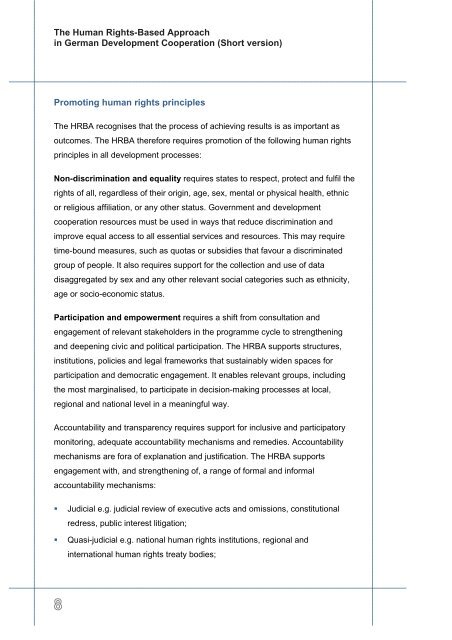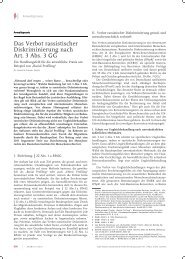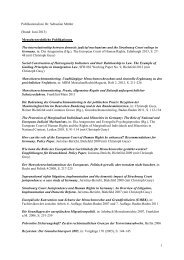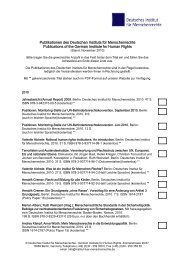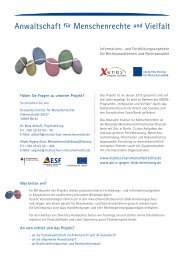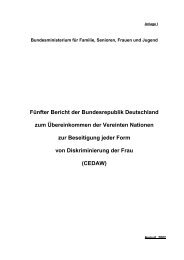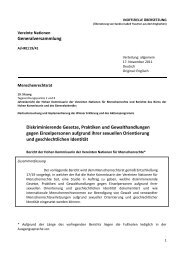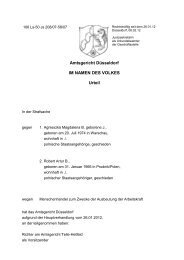The Human Rights-Based Approach in German Development ...
The Human Rights-Based Approach in German Development ...
The Human Rights-Based Approach in German Development ...
Create successful ePaper yourself
Turn your PDF publications into a flip-book with our unique Google optimized e-Paper software.
<strong>The</strong> <strong>Human</strong> <strong>Rights</strong>-<strong>Based</strong> <strong>Approach</strong><br />
<strong>in</strong> <strong>German</strong> <strong>Development</strong> Cooperation (Short version)<br />
Promot<strong>in</strong>g human rights pr<strong>in</strong>ciples<br />
<strong>The</strong> HRBA recognises that the process of achiev<strong>in</strong>g results is as important as<br />
outcomes. <strong>The</strong> HRBA therefore requires promotion of the follow<strong>in</strong>g human rights<br />
pr<strong>in</strong>ciples <strong>in</strong> all development processes:<br />
Non-discrim<strong>in</strong>ation and equality requires states to respect, protect and fulfil the<br />
rights of all, regardless of their orig<strong>in</strong>, age, sex, mental or physical health, ethnic<br />
or religious affiliation, or any other status. Government and development<br />
cooperation resources must be used <strong>in</strong> ways that reduce discrim<strong>in</strong>ation and<br />
improve equal access to all essential services and resources. This may require<br />
time-bound measures, such as quotas or subsidies that favour a discrim<strong>in</strong>ated<br />
group of people. It also requires support for the collection and use of data<br />
disaggregated by sex and any other relevant social categories such as ethnicity,<br />
age or socio-economic status.<br />
Participation and empowerment requires a shift from consultation and<br />
engagement of relevant stakeholders <strong>in</strong> the programme cycle to strengthen<strong>in</strong>g<br />
and deepen<strong>in</strong>g civic and political participation. <strong>The</strong> HRBA supports structures,<br />
<strong>in</strong>stitutions, policies and legal frameworks that susta<strong>in</strong>ably widen spaces for<br />
participation and democratic engagement. It enables relevant groups, <strong>in</strong>clud<strong>in</strong>g<br />
the most marg<strong>in</strong>alised, to participate <strong>in</strong> decision-mak<strong>in</strong>g processes at local,<br />
regional and national level <strong>in</strong> a mean<strong>in</strong>gful way.<br />
Accountability and transparency requires support for <strong>in</strong>clusive and participatory<br />
monitor<strong>in</strong>g, adequate accountability mechanisms and remedies. Accountability<br />
mechanisms are fora of explanation and justification. <strong>The</strong> HRBA supports<br />
engagement with, and strengthen<strong>in</strong>g of, a range of formal and <strong>in</strong>formal<br />
accountability mechanisms:<br />
• Judicial e.g. judicial review of executive acts and omissions, constitutional<br />
redress, public <strong>in</strong>terest litigation;<br />
• Quasi-judicial e.g. national human rights <strong>in</strong>stitutions, regional and<br />
<strong>in</strong>ternational human rights treaty bodies;


